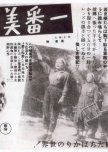
This review may contain spoilers
Kurosawa WWII propaganda film
In 1944 Kurosawa Akira made The Most Beautiful, a propaganda movie about women volunteering to make lenses used in the war machine. Heavily censored and primarily to boost morale, as most wartime propaganda films were/are, Kurosawa chose to show not only the commitment of the women involved but also the sacrifices they made with their families and their health.Director Watanabe, a young woman who calibrates lenses at the Hiratsuka factory, works with management and with the workers. When the women are given the order to increase production by 50% over the next four months, they are offended because the men were ordered to increase theirs by 100%. Watanabe convinces the company that the women can increase production by 67%. As the women boost their efforts, they are also called upon to create a drum and fife corp. Everyday they march down the street outside the factory. When production decreases they are told to do something fun and begin playing volleyball in their free time. As days drag on, fatigue begins to wear on their bodies and minds. Illnesses, a broken leg, and bickering take place. Despite the setbacks, all of the women who recover cheerfully return to once again do their part for the war effort. Watanabe sees their responsibility as critical to the men fighting, how even one defective lens could mean a man's death, and the man's death could lead to a loss for the military. Follows the old story "For want of a nail the shoe was lost, for want of a shoe the rider was lost…" She goes to obsessive lengths to make sure a lost uncalibrated lens is found. Even when a parent dies and the company says Watanabe should go home, she refuses, determined to continue the mission, grieving silently to herself later.
There were many propaganda signs hanging about. "Follow the example of the war dead." "Follow the example of Yamamoto." "Troops are in the enemy's sights." And the main director's advocation of "One can't improve productivity without improving one's character," was quoted often. Aside from the factory being populated by women, the "men" who also worked there in the ranks looked like boys. The management was made up of middle-aged men, but the workers seemed quite young.
Irie Takako played what amounted to a house mother, but a woman the young women admired and listened to. Yaguchi Yoko as Watanabe was the heart of the story as she struggled to motivate the women in her charge to work harder and also managed their personal problems and illnesses. Yaguchi would marry Kurosawa the next year. Shimura Takashi had a glorified guest role at the beginning of the film as the director of the factory. All of the supporting management characters were overly benevolent and compassionate as if to tell people it would be safe to send your daughters to work and live in these facilities.
Kurosawa was able to make a film as much about the dedication of the young women and the toll the work took on their bodies and minds as he did about their role benefiting the military and the country. At 85 minutes it felt much longer as there was only so much I could watch of people manufacturing lenses and hearing propaganda. The historical aspect of it was interesting but as a piece of art, not so much, though Kurosawa did what he could. If you're interested in old propaganda films or are a Kurosawa completionist, I fall into the latter category, it's worth checking out. Otherwise, it might be best to skip to One Wonderful Sunday or Drunken Angel.
7/18/23
Was this review helpful to you?
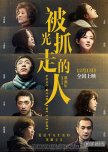
This review may contain spoilers
What's love got to do with it?
Gone with the Light was a thoughtful meditation on what romantic love is and the extent to which we need it in our lives. What happens when an inexplicable beam of light judges your relationship and love as inadequate? Do you examine yourself and your life? Or do you make excuses and justifications? Do you accept that you must live without love?One spring morning a beam of light causes a fraction of the people from the planet to disappear. The story focuses on three people left behind, Wu Wen Xue, a teacher who has been married for nearly 20 years; Lin Nan, an officer worker in the process of divorcing her philandering husband; and Kuai Zi, a small-time hoodlum who says he doesn't believe in love but is desperately searching for his partner in crime. Though not connected their paths do inadvertently cross at times.
"It's only us who can define our love." Wu is the emotional heart of the film as he wrestles with his stale marriage and the discrimination he faces at work for being morally suspicious as one left behind. Wu becomes desperate to prove he and his wife love each other even sinking to buying photoshopped pictures and a fake train ticket showing she was out of town during the beam which explains why they weren't taken together. Initially, he tries to save face during an increasingly unstable social order but soon he is forced to confront the reality that his marriage wasn't working and was built on convenient lies, both his and hers. Huang Bo gave a lovely nuanced performance that strengthened the emotional depth of the film.
"You take in my trash and treat it as treasure." Li Nan is confronted by her husband's mistress when he disappears. The two women begin their odyssey of discovering who he truly loved and disappeared with. Along the way they discover more about themselves and their feelings for the man they shared. They also uncovered parts of his life hitherto unknown, finding neither had truly understood him.
"We're all the same. We don't have love." Kaui Zi was the least developed character, someone who eschewed loved but whose desperation in finding his partner hinted more than a little at a same sex love, at least on his part. Through him we see another man who killed his wife for putting green onions in his stir-fry, an obvious demonstration that she hadn't loved him which is why they didn't disappear.
"It's already proved there's no love." A young woman whose parents refused to let her marry the guy she was in love with watched them disappear during a heated argument. The father had numerous mistresses and the mother was an inveterate gambler and neither ever showed any love toward the other. What is true love?
The light beam was never explained, which is okay, because the story was about the human response not the initial supernatural action. As one character stated, "Love is sci-fi enough." No one truly knew why the people disappeared or if it was even a good thing, but the ones left behind felt envious and ashamed, often sinking into despair. Even when the government eventually refuted the true love entanglement cause, people still felt as if their relationships and their lives had been judged as loveless. Many of the people taken were in affairs or unhealthy relationships, yet people always want what they don't have. For the people who took advantage of the gift of being rejected it gave them the chance to evaluate themselves and their relationships.
Love can be exciting, messy, complicated, pedestrian, and gently satisfying. Other times it is elusive as smoke. People find and cultivate what gives them meaning. The light beam caused those who were left behind to examine what it is they wanted, what might be missing from their relationships, and what responsibility they owned in that. Gone With the Light was a quiet reflection on love and relationships anchored by strong performances. My favorite scene was the last one. It is often during the routine and mundane where we find love, comfort, and even forgiveness. What is true love? Something you have to define for yourself. This film will not be for everyone, but if this is your type of film, you might find a hidden gem.
"The light won't give us an answer. It's a test, a projection of oneself to let us truly face ourselves and then move on in our lives."
7/14/23
Was this review helpful to you?

This review may contain spoilers
Pride or Justice?
This story reminded me of Ikiru when Watanabe tenaciously visited department after department each hidden behind a wall of red tape to get a park built. Qiu Ju, the title character, quietly, persistently confronted the ever-expanding layers of legal hierarchy to gain satisfaction after her husband was kicked in the chest and groin by the village chief over a supposed slight. All she wanted was for the stubborn chief to admit what he did was wrong and apologize which was something he refused to do.Poor farmers and living above the snowline, Qiu Ju sold much of their chili crop to have money for her trips to significantly larger towns as she implored officials to resolve her case satisfactorily. From the beginning each of the officials agreed that the chief needed to pay for her husband's medical bills and lost wages. Qiu Ju didn't want the money, she wanted an apology, but the chief managed to offend and belittle her at every encounter. The story began to feel repetitious as Qiu Ju and her sister-in-law traveled to the next city and next official in hopes of gaining justice.
Qiu Ju was the irresistible force and the chief was the immovable object, both stubborn and prideful. Qiu found out what many have before, that people in power rarely admit to wrongdoing and would rather hand over money instead of losing face. Near the end of the film as Qiu Ju gave birth and the chief was called upon to help because her life was in danger, the interconnectedness and interdependence of those living in the remote village came into clearer view. In the final scene, she was forced to weigh her actions when the consequences were doled out. The film finally scratched below the surface of Qiu Ju's journey. Perhaps in the end both learned a lesson in prideful actions and the importance of community.
Zhang Yi Mou is known for his gorgeous settings and color saturated scenery. This was a more beige film with the demarcation between snowy mountain village and urban city quite stark. The village could have been from 50+ years ago with the large wheel barrow carts, bicycles, and occasional motorized cart. The modern (1992) city in contrast was loud, crowded, and busy. The sisters-in-law stuck out with their simple clothes. ZYM filmed the crowds clandestinely, giving an authentic view of the bustling streets. Posters of both Chinese and American movie stars covered walls. It was interesting to see how the wheels of justice moved for those with the least power, but color me cynical at believing each layer of law enforcement justice would move as quickly, politely, and seriously for a peasant woman who in essence was only seeking an apology.
I've read this film is considered a comedy, but I failed to see it with the exception of one scene where Gong Li was told to buy new clothes so that she wouldn't be targeted by scammers. She ended up purchasing a large striped blazer which should have been considered more of a tragedy than comedy as it further hid her body and made her look even more like a gullible country bumpkin. Between the pregnancy pads and an enormous green scarf wrapped around her head it was hard to recognize her in some scenes. A close-up of Gong Li's beautiful face was not even used until the final shot. Despite having her face nearly obscured for much of the film, her charisma shone through as the uneducated, dutiful wife who despite her husband's protestations, would not let go of her need to hear from the chief that they had been wronged and it was not in his power to physically abuse her husband. There were only a handful of actors in the film, the rest were local people, much like in Not One Less. Liu Pei Qi represented well the patient long suffering husband who saw their store of peppers quickly dwindling as Qiu Ju monetized them in her quest for justice. The village though desperately cold was warm with human compassion as her husband's family and the chief's family all got along well and worked well with each other with the exception Qiu and the chief. Overall, it was a gentle law and order slice of life.
As an historical window into 1990's China, The Story of Qiu Ju was informative showing the busy market places and traffic and the snowy paths the neighbors' walked up the mountain to the little farming village. Viewing a Gong Li performance is always worthwhile. But in the pantheon of Zhang Yi Mou films, I found this one to be less than enthralling as Qiu traveled from city to city beseeching officials who repeatedly gave the same answers. There weren't any bad guys, with the exception of one con artist, the people Qiu met were polite and helpful. Even the chief came through when it counted. Qiu began to look more petulant and obsessed as the film went along. While I could appreciate Qiu Ju's quest for justice, at some point, much like the chief's stubbornness in not apologizing, it became a pyrrhic victory.
7/11/23
Was this review helpful to you?
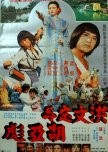
This review may contain spoilers
Toadily ridiculous!
The Guy with Secret Kung Fu looked like a lot of other cheap Taiwanese kung fu movies from this timeframe. Where this film won me over were the sound effects which truly had me laughing in many scenes whether that was the director's intention or not. They must have gotten a deal at Discount Sound Effects R Us and decided to use as many as possible.Once again, the plucky Ming rebels are fighting the Qings. This time not only must they deal with the hated dynasty but also Sally Chen's fearsome Dragon Gang! Brothers/blood brothers Hung Wei Ting (Mang Fei) and Hu Ah Piao (Li Chung Chien) take down a bunch of Chin Wan Che's brown shirts when the Dragon Gang attacks Elsa Yang and her father on a boat. The Dragon Queen is not happy when her men are beaten nor are the Qing officials. Wei Ting is captured in town and his brother has to break him out. When they slow down to help another escaped prisoner the boys are captured once again. Wang Hsieh as a Qing official lets them loose hoping they will take down the Dragon Gang. It makes less sense as it goes along, but it gives the boys plenty of opportunities to fight and take their shirts off and the girls to be attacked or kidnapped and need rescuing.
The story becomes more interesting when a sorcerer played by Shih Chung Tien brings to life a half-human/half-vampire demon with super strength played by perennial giant Cheng Fu Hung. None of the brothers' kung fu abilities have any effect on him. Fortunately, he tosses them through the wall of the coffin maker's shop thinking them dead and the daughter played by Nancy Yen takes a fancy to them. She just happens to have a secret kung fu book! Of course, she does! It details The Dragon Fist technique and also has a recipe for defeating the demon! Holy Deux ex machina Batman!
The final fights are loads of fun. Sally Chen and her tricked out poison dart thrower, the Sorcerer, and Wang Hsieh with his Toad style against the boys and their newly acquired Dragon Fist moves accompanied by some of the most ridiculous sound effects ever were exciting.
Despite the movie being a Hong Kong production, I knew immediately it was shot in Taiwan. Per usual, the film relied on outdoor scenery, especially the woods and a field of tall grass. The movie was also badly faded as many of them have not been restored. Taiwanese actors and actresses populated the movie-Mang Fei, Nancy Yen, Sally Chen, Wang Hsieh, Shih Chung Tien, and Elsa Yang.
The fights, especially, the first one on two boats and the last ones in the woods and tall grass were quite entertaining. Other fights varied but were a step above kung fu posing. Li Chung Chien appeared in less than 10 films but made a good partner for Mang Fei. Sally Chen was the most charismatic villain with her poison dart gun and glorious dresses. Elsa Yang starred in a number of ninja movies and would have made a good foil for her but aside from Sally, the rest of the female cast were relegated to screaming, "Help me! Help me!" Wang Hsieh's Toad style was hilarious as he blew out his belly and hopped about all while toad sound effects ribbeted in the background. The good guys did some super leaping themselves, mostly filmed in reverse.
Truly, the sound effects were the star of this film, many anachronistically so. Plane sounds when the boys jumped and were thrown about, gunshots for darts, fireworks swirling, frogs croaking, pew! pew! laser noises, and also the standard swish and clash kung fu sound effects. The "demon" sounded like the Tin Man needing more than a few drops of oil from his oil can. The movie itself was badly edited making it quite confusing as it jumped in time and from scene to scene leaving important bits out. The print I watched had been chopped to fit a screen somewhere in its past making me grateful it was dubbed. Otherwise, it might have fallen victim to the subtitles running off the screen or being illegible with the light background.
The Guy with Secret Kung Fu-actually it was Two Guys with Secret Kung Fu-was not a great kung fu flick nor did it have great kung fu, but it was toadily ridiculous and entertaining in its own comic way. Only for the most hard core of old kung fu film fans. As always, these pre-1990 cheap niche movies I grade on a curve.
7/6/23
Was this review helpful to you?

This review may contain spoilers
We're going to need a bigger boat---of butter!
Monster Seafood Wars could have been good campy fun if it had given me even one human to root for. I started out octo-mistic, but as it was, I was on Team Kaiju right up until near the end when a surprise hero came to the rescue and almost made the other 74 minutes worthwhile and I'm not squidding.As someone who has seen her share of Kaiju films, I'm prepared to go along with almost any convoluted storyline they want to hurl at me. This one started with Yuta taking his father's offering to the priest for the annual blessing at the shrine when he's knocked off his bike and his offerings of octopus, squid, and crab are stolen. They end up in the river with ominous bubbles floating over them and the next thing you know, the octopus and squid are ginormous and fighting each other in the city's skyline. The news media names them Takolla and Ikalla. Turns out Yuta had developed SETAP Z which causes animals to become huge. He was fired for going over budget and coincidentally his formula was also stolen. Yuta is hauled into the police station and interrogated by a SMAT (Seafood Monster Attack Team---seriously) commander and his childhood crush who works for the defense minister. He and his ex-work rival and rival for Nana, Hikoma, join SMAT to determine the best way to rid themselves of the seafood infestation. Hikoma has developed giant vinegar canons (I can't make this stuff up) that will spray the beasts and weaken them. It seems to work but then the giant crab, Kanilla, appears and lops off a few octopus and squid arms. Kanilla is unaffected by the vinegar attack and it's back to the drawing board for our heroes, and I use that term loosely. The positive thing that came out of the fight? Apparently, Kaiju meat is enormously delicious. Every restaurant in town tries to get their hands on the rare meat and patrons swamp to the select places that do carry it.
Monster Seafood Wars' writing was more damaging than a Kaiju romp around Tokyo. Yuta, Nana, and Hikoma acted like petulant 12-year-olds throughout the movie causing me to hope they ended up as steak tartare for the beasties. In a scene that harkened back to the sexist 70's, the two males made a bet that whoever won got Nana. Girl was sitting right there next to them while they were pounding their chests. Nana wasn't much better, other than saying derogatory things to Yuta and having expensive dinners with Hikoma, she didn't do much for someone with such a haughty attitude. The boys did nothing but fight and hurl insults at each other, refusing to work together even for the fate of the world. Go Team Kaiju! The only thing that turned this film around for me---spoiler alert--- was Yuta's buddy who unleashed a giant chef robot named Jumbo Cook near the end up the movie to carve the Kaiju into sushi. The last ten minutes were actually good campy fun.
This film was extremely low budget which wasn't a problem for me. I've watched a number of super cheap Kaiju movies and enjoyed them. The sets and props were about as low tech as it gets. The Kaiju looked more like the inflatable stick figures used at car dealerships than guys in rubber suits. Worst of all for me, the focus was almost entirely on the terrible three and their childish behavior. Listening to them bicker for nearly 86 minutes was more painful than whatever the squid with the big eyelashes could have hammered me with.
If you grew up watching Saturday morning children's tv shows with guys in monster or action costumes dancing about and bad acting this may give you a sense of nostalgia. But even the most stalwart seafood lover might find The Seafood Bowl nauseating. Far from being ex-squid-sit, it was clawful.
7/5/23
Was this review helpful to you?

This review may contain spoilers
"I don't understand"
The Three Swordsmen had an excellent cast-Andy Lau, Brigitte Lin, and Elvis Tsui as the titular swordsmen. And that's pretty much it. I have watched a number of old kung fu movies with convoluted plots, but this one took the cake. When a character made the comment, "I don't understand," I wanted to say, you and me both dude.Andy Lau played "Smiling Sam"/Siu Sam Siu one of the three best swordsmen in the country. He was tied with "Blade" Wham Dao (Elvis Tsui) whose skills had earned him a place commanding the military. Most perplexing was Brigitte Lin as Ming Kim/Ming Jian who was not cross-dressing but actually playing a married man with a child and dubbed with a man's voice. Siu was framed for theft, rape, and murder. And that's about as much as I can tell you. He steals a man's wife. Falls in love with someone else. Ming helps him out or so he says. Wham discerns that something else is afoot, but palace and other politics preclude him from investigating the case as he would wish.
The fights were ridiculously dreadful. The director enjoyed filming too close or at odd angles obscuring much of the action. Yuen Bun and Tony Leung Siu Hung could usually be counted on for entertaining fight choreography, not in this film. The wire work and light body super leaping were comically bad. There was an awkward duel in the trees and over water predating CTHD and Hero, but were a prime example of how valuable good direction and cinematography are. Siu had his Invisible Whirlwind technique which belonged on a Saturday morning kids' show. He could also decapitate and disarm opponents with his clothes. One woman like a white-haired witch could defeat opponents with her hair. She even paused during a fight to breast feed her child.
The film was not pleasing to look at, the framing and cinematography were subpar. The pacing was erratic. And seriously, why would they dub Brigitte Lin of all people with a man's voice? It didn't appear to be done satirically. You know a story is confusing when characters have to stop and repeatedly dump pages of complicated and baffling exposition on the audience. It also felt like half the cast was playing the movie for laughs, especially Lau. Lin and Tsui were deadly serious along with a few other characters. I wondered if two writers wrote different parts of the story separately and then tried to do a mash-up of them.
The Three Swordsmen could have been so bad it was good. I found it so bad as to be annoying. The only good thing about the movie is that it was only 86 minutes long.
6/26/23
Was this review helpful to you?

This review may contain spoilers
"Let's eat together"
Tiger Love was a strange story amalgam of kung fu, Romeo and Juliet, and weird horror. None of the three actually worked although the horror aspect was memorably bizarre.Sher Shin Lan (Hug Chin) and Lin Shao Ho (Lo Lieh) are lovers and on the run because they come from warring clans. Sher's dad and his men have the two trapped on the edge of a cliff. When Shin Lan thinks they've kill Shao Ho she leaps from the cliff and is assumed dead. Now is when the story gets weird. She lands in a tree with a tiger attempting to climb up it to eat her. In fear she pees on the tiger and passes out. The tiger takes her to his cave and cares for her. She thinks it's because if a woman kisses a tiger he becomes her slave. Um, pretty sure she didn't kiss him unless that was edited out, but the kiss is alluded to several times. She has Shao Ho's baby and Uncle Tiger helps her raise him. A young Shao Chang whacks the tiger in the nose with a stick and the tiger leaps at the child with a freeze frame on the child's terrified face. Child Services Line 1!!
Shao Ho grows up and meets his father who is actually alive! He goes to live with him and traps a girl from the Sher family during a hunting expedition and the two fall in love. Papa Sher (Wang Hsieh) will not allow it nor will Papa Lin. The Lin patriarch kicks Shao Chang out. After the Sher heir is mysteriously killed (and stays mysterious to the end of the movie), Shao Chang is blamed and the Shers ambush the Lin family and kill nearly everyone. While looking for Shao Chang, his mother is mortally wounded by the Shers. She begs her son to not seek revenge so that she can rest in peace. He agrees. The tiger, however, doesn't. He kills a man and declares that for 20 years out of love for Shin Lan he hasn't killed a human. In the past, he'd eaten 99 humans and with this 100th kill he will now become a tiger demon! During the day he's a tiger but at night he turns into a green glowing fanged witch with tiger paws for the kill. Vowing vengeance on the Sher family he begins to take them out. Some of the attacks looked frighteningly real. This was no CGI tiger, but the real deal! When the tiger demon disguises himself as the Sher grandma and asks to be let into the house by Shao Chang's love, all I could hear was, "my grandma, what big teeth you have!" going through my head. When the tiger demon states, "Let's eat together," it's not what the young women think their "grandma" means.
The kung fu wasn't great and there wasn't much of it. Stephen Tung would choreograph martial arts for more movies than he would act in and going by this film, that was a good thing. The young romance wasn't very believable. Lo Lieh didn't have many scenes but he could act at least by kung fu standards and was entertaining to watch. Wang Hsieh as the bad clan leader could play the role in his sleep and might have. The editing was choppy at best and the story pacing was awful. For a story with a wide variety of conflicts it could be painstakingly slow during the middle segment. The last 20 minutes with the tiger demon was so amazingly crazy that at least it might keep your attention. The most suspenseful part of the movie was wondering if the actors and stuntmen walked away from the mauling scenes in one piece. The two young lovers were also related, was she his aunt? Or was his mom her aunt? They skimmed over the family connections. Bestiality was implied a couple of times between the mom and the tiger, but I just refused to let my mind go there. Like I said, this was one weird movie.
I'm on a quest to watch as many Lo Lieh films as I can which is why I put myself through this mess. Unless you are in the mood for a poorly made and utterly strange kung fu film, or a kung fu filmdom completionist, my advice is to skip this one.
6/23/23
Was this review helpful to you?

This review may contain spoilers
You killed my father, prepare to die!
Revenge of the Shaolin Kid aka Master of Death was your standard kung fu revenge film except that the hero completed his training before the movie started so that we missed out on the Shaolin training montages. The story didn't try to throw in any curveballs for the viewer, but kept to the straight and simple revenge path. No secret books, no secret lists, just "My name is Li Tian Zhou. You killed my parents. Prepare to die."Chi Kuan Chun's Li spent eighteen years training at a Shaolin temple until he was ready to avenge his parents' murders. He had to fight his way through numerous baddies before ultimately taking on Lo Lieh's Big Bad Kim. Near the end of the movie he stupidly believed Chiang Tao when he told him that Lo was not the bad guy, that Chen Sing was. Dude, you never believe Chiang Tao, he's always a henchman for the Big Bad. Chen Sing playing against type was the good-hearted doctor who laid his sword down years ago. Somehow Chen ended up fighting and kept his shirt on.
The fights were slightly above average for Taiwanese kung fu films from the time, not super-fast, but not kung fu posing either. Lo Lieh had a spinning dagger which didn't do much although it made a funny noise and was distracting. Chi Kuan Chun had one facial expression but he was easy on the eyes and moved fluidly. Chia Ling and Wu Ma livened up the movie during their cameos in a casino brawl scene. Lo and Chen were always fun to watch regardless of what else was going on in the movie. Chi's cocky stoicism began to wear thin by the end especially due to an idiotic decision his character Li made regarding Chen's character. I almost started rooting for Lo's despicable character or at least a deadly draw in the final fight.
Due to its linear nature, Revenge of the Shaolin Kid avoided the convoluted storyline holes so many kung fu films fell into which worked to its favor. The need for revenge against several people provided ample opportunities for fights, the sole purpose of old kung fu flicks. There were enough charismatic cameos to help gloss over Chi's one note performance. Not a great film, but not a bad one either, just slightly below average for the genre. As always, I rate these old niche movies on a curve.
6/19/23
Was this review helpful to you?
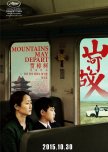
This review may contain spoilers
"Nobody can be with you all through life"
Director Jia Zhang Ke confronted the topic of change loosely through the life of one woman in three different decades and through the lens of three different aspect ratios of filming. The story observed how the changes that globalization, capitalism and the diaspora of people going west affected the characters involved. Beginning with the first segment's love triangle, the characters continued to become more disconnected to each other. As some characters moved away from their homeland there also became a disconnect between parent and child culturally and linguistically. Change is inevitable. Mountains may depart, but can relationships be sustained?The film begins in 1999 with an energetic group dance set to the Pet Shop Boys' "Go West" and then moves into the streets with traditional parades and celebrations. In their twenties, Tao is being courted by poor mine worker Lianxi and up and coming capitalist with his own car Jin Sheng. When Jin Sheng recklessly and breathlessly teaches Tao how to drive the lesson ends in an accident. Tao's excitement shows it's clear which partner she is going to choose. Ambitious capitalists are hard to resist even if they are of course going to turn out to be awful.
2014 arrives and Tao is divorced keeping custody of the dog and a gas station while Jin Sheng has custody of their son, Dollar. He and his new wife live an extravagant lifestyle far away from the rural mining town. When her father dies unexpectedly, she tells Jin Sheng to send their son to her for the funeral. Dollar arrives with a Hermes scarf around his neck and no knowledge of the funeral customs. Instead of putting him on a plane to return to his father they take the slow green train so that she can spend more time with him. She shares Sally Yeh's "Take Care", a song important to her, with him on her headphones in an effort to connect with her son.
2025 is set in Australia where Jin Sheng has emigrated to because he had gotten caught up in China's anti-corruption campaign and can't go home. Dollar is taking a Mandarin class taught by 60-year-old Mia as he has forgotten most of his native language. Mandarin is not the only thing he has forgotten, he barely remembers his mother. His only connection is the key she gave him hanging around his neck. He grows closer to Mia when she plays "Take Care" in class and the song stirs distant memories in Dollar. For the most part Dollar and his father are unable to talk without Google or Mia translating for them. Dollar ends up in an almost Oedipal relationship with the older teacher who encourages him to go home and see his mother.
Mountains May Depart started out with a love triangle where Tao had to choose between the traditional and the dangerous new capitalism. Materialism and excitement won out but came with a price, the loss of her marriage and her son. She relinquished her son again thinking that his father's wealth could offer him things she never could. And yet the materialism and education offered could not replace his mother's love and traditional values. While capitalism was shown as causing moral decay-the father had a coffee table ridiculously full of guns and booze in Australia-it was also used for good. When Lianxi returned dying of lung disease from working in coal mines, Tao was able to pay for his treatment when his poorer friends and relatives couldn't help. Interestingly, Australia's scenery was lush and green with brilliant blue skies compared to China's often dingy gray skies and landscapes with the exception of Tao's ubiquitous red coat. Whether this was a social commentary I couldn't say or what it meant. The view Jia gave of Fenyang was that it had not shared equally in the economic progress with much of the community at the mercy of the vacillating prices of coal.
Many questions were left unanswered. Tao and Dollar had cellphones, why didn't they keep in touch? What happened to Lianxi? We were shown none of the marriage causing the viewer to fill in the gaps. Did Dollar ever go home to reunite with his mom? Did Dollar find a way to reconcile the life he was living with his cultural heritage? And why did no one in Australia have an Australian accent?
Random thoughts about the production values: Aside from Zhao Tao's performance the rest of the cast could not measure up, which became readily apparent in the 3rd act when she was almost completely absent from the screen. The music was used to good effect including the pop songs repeated. Aside from the repeated music, Jia liked to show repeated items and people. At first I thought my television set was having problems and then I realized that each segment was filmed in a different aspect ratio going from small (1:33:1) to cinemascope (2:35:1) showing the change in film as well. I found it interesting that Jia included bits of random film he'd taken in 1999 in the first act. Some of the dialogue was clunky especially when father and son were talking about the different meanings of "freedom."
The film was slow and began to feel overly long, especially without Tao's presence during the final third of the film. Whether globalization leads to meaninglessness and isolation or increased understanding remains to be seen. Notwithstanding Jia's thematic intention, what I got out of the film is how important communication and connection is, especially for family, regardless of where everyone is on the globe. Despite political affiliation and economic status, age gaps occur and only understanding and effort can bridge them. If not for meaningful relationships, what does one cling to when the mountains depart?
6/12/23
Was this review helpful to you?

This review may contain spoilers
"It's a trap!"
Hansan: Rising Dragon is a prequel of sorts to Admiral: Roaring Currents, with the events taking place five years earlier. The battle we are told was a war of the righteous against the unrighteous as Hideyoshi of Japan sought to put both Joseon and China under his heel. To protect his country, the shrewd and stoic Admiral Yi Sun Sin took on the ambitious and cocky General Wakisaka in a deadly game of oceanic chicken.The film begins with Joseon having suffered several humiliating defeats. In a battle of spying and strategizing, both sides seek to gain the upper hand for the inevitable sea battle. Yi's ship designer has developed plans for a new and improved turtle ship which the Japanese promptly steal. The first three quarters of the film deal with spying, coordinating or killing allies, and preparing for the fights for survival on land and sea.
Having watched Admiral: Roaring Currents I was underwhelmed with this film. It was lacking in the same tension and energy. Much of the first half of the film bounced around so much that it was hard to keep up, much less emotionally connect with any of the characters. I was surprised to discover the same man directed both. I suppose the difference was that The Admiral had a different screenwriter. The pacing and character development were noticeably lacking in comparison to the previous film.
Overall, the acting was serviceable. Park Hae Il played Yi so stoically that the famous admiral seemed devoid of any personality. He held the same expression throughout the film regardless of what was going on around him. The only character who drew me in was a samurai who pledged his allegiance to the great Joseon admiral. Kim Sung Gyu gave a compelling performance as the double agent who chose to fight on the side of righteousness. The bloated cast had many a familiar face if you could make them out behind the beards.
The water battles and CGI were spectacular giving you the claustrophobic experience inside a ship all while showing the full scope of battleships with their canons firing and splintering the opposing ships. The water sequences worked well with the varying currents as did the fog and wind elements. The land skirmishes lacked any weight to them and seemed very small scale in comparison to the sea battles.
The final fourth of the film was engaging as Admiral Yi showed why navies around the world have studied him even centuries later. Outnumbered and outgunned he outfoxed Wakisaka in a game of Crane Wing vs Fish Scale. This was a man you did not want to play chicken with, especially when death was on the line. I only wish the first three-fourths of the film had been remotely as captivating as the final showdown.
6/10/23
Was this review helpful to you?
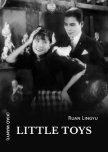
This review may contain spoilers
"They have the strength, the brains, and the will to struggle!"
Little Toys not only told the tale of a passionate and talented young toymaker, but also used the toys she made as an analogy for the war creeping up on her doorstep. The movie was decidedly propagandistic and no wonder with the strain of civil wars being fought at home and a foreign army invading as well. Like many in their situation, movies were not only entertainment, but at times catharsis and a call to arms.Ruan Ling Yu played Sister Ye/Xiu Xiu, a toymaker extraordinaire in an idyllic rural village, whose business kept many people fed. Married to a slovenly, but kind husband, she had two children to care for as well. A handsome engineering student in town fell hard for her, but she refused to run away with him. Always seeing the big picture, she challenged him to finish his degree overseas and return to China to improve their country's industry and help lift the poor out of poverty. Emboldened by her patriotic words he set off to do his duty.
The movie begins with numerous comedic moments, but this is a Ruan Ling Yu film so don't fall for it. She once again played the avatar for the suffering women of China, if not China herself. Despite being loyal and patriotic, not the flawed fallen women she often played, she still met with endless suffering. Along the way she dealt with the death of loved ones, the disappearance of a loved one, civil war, becoming a refugee, competing with cheap foreign goods, the Japanese invasion and the infamous January 28th incident, as well as debilitating PTSD. That was a lot of tragedy to work into one film.
At the time, China was dealing with class issues as well as political ineffectiveness and corruption. To avoid censorship, the name of the invading army was never mentioned. You didn't have to be a history major then or now to know who it was. While some of the speeches meant to inspire felt organic to the scene, some of the leftist and nationalistic speeches could be stilted and rather awkwardly wedged into conversations.
What I found interesting was the use of toys as a metaphor for the soldiers, playthings moved about during war. Scenes of toy guns, tanks, and planes were overlaid with battle scenes. Many of the weapons, planes, and tanks used in the battles resembled the toys previously shown giving the scenes a surreal feeling as toys gave way to deadly reality. Even at the end of the film, Xiu Xiu confused her toys with real soldiers and weapons, calling them to fight.
Ruan Ling Yu gave a nuanced performance exhibiting numerous emotions from gentle caring mother to a woman broken by war and tragedy. She truly was a gifted actress taken from the world too soon. Li Lili, another famous silent film actress, portrayed Xiu Xiu's teenaged daughter. Though not as subtle she also gave an impassioned and at times light-hearted performance.
While Ruan was captivating, wringing as much emotion as she could from each scene, the film felt overly long and disjointed at times. Because it covered so much ground and often glanced quickly over tragedies, I found it difficult to connect emotionally with the large cast. The film felt more important as a historical piece than as a piece of entertainment. When Ruan pierced the crowd around her with a steely gaze at the end of the film and shamed them, declaring they needed to fight for their country's survival and then stared directly into the camera challenging the audience, it crossed over from being a popcorn movie and into a call to arms. There has always been a place for these kinds of propagandistic movies, especially during times of desperate national crisis, it's just best to know what you are going into with this film as it could be heavy-handed at times. To be sure, regardless of your feelings about the subject matter, the film is worthwhile viewing if only to watch one of the few surviving Ruan Ling Yu films.
6/5/23
Was this review helpful to you?

This review may contain spoilers
Three vivacious boys and the mountain they live on
Hang in There, Kids! was written and directed by Taiwan's first female indigenous director, Laha Mebow. The film features three mischievous boys who live on a picturesque mountain and are about to graduate from the 6th grade. Though they go about their days in a joyful, care-free manner, their smiles hide very real pain.Watan who is an orphan living with his grandmother is the de facto leader of the group. He is overjoyed that his high school dropout brother has returned from Taipei to help with his grandmother's farm. Watan also harbors a not-so-secret crush on his afterschool teacher, Lawa, who is confined to a wheelchair. Chen Hao lives with his aging single father and longs for his absentee mother. The last of the group and the shortest is Lin Shan who wants to be an NBA player like Jeremy Lin. His father drinks too much and belongs to a band that struggles to find gigs in Taipei.
Whether pinching Watan's grandmother's veggies or Chen Hao's dad's peaches to sell illegally on the road or running away to spend the night with a French couple on the mountain, the boys always find joy in the moment. Despite their troubles they look for fun and adventure wherever they are. A fieldtrip to Taipei with their class gives each of them a chance to discover or share something important.
Music is woven throughout the film whether it is a naughty ditty the boys sing, a father's heartfelt apology and love for his son, or a woman's song of love and life after a crushed dream. The songs are skillfully used to not only enhance the emotions in a scene but also to tell part of the story.
The three boys carry the weight of the film on their small shoulders as the conflicts in this slice of life film are minimal. Watan's brother becomes involved with marijuana growers looking for land, Granny needs new teeth, and there's the small meaningful disclosure of the teacher's former life, but it's not like there are huge plot revelations. Most of the film is played out through the boys' daily lives and their search for a mother, a father, or a gift of love to a teacher. The boys' natural and energetic performances brought to gentle life the telling of their stories. If ever there was a setting that could be billed as a co-star it would be the scenic, mysterious mountain the boys traverse during their adventures.
There was a peaceful mood to this film. Even with the familial problems, the boys were close and tactile with each other and the other adults in the film. Lawa may have been in a wheelchair, but her heart soared to the children she cared for and the mountain around them. A sense of community and pride defined the story and the Sqoyaw people within it. Hang in There, Kids! was 90 minutes of friendship, family, and a little heartache. The mountain had its dark side but there was always something to discover. "What do you know? Maybe great things will happen." This tranquil, touching film about childhood is one to try if you enjoy this genre.
5/26/23
Was this review helpful to you?
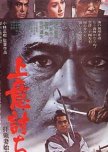
This review may contain spoilers
"Each must live his own life"
In Samurai Rebellion, there was a rebellion, but not of swords and muskets, a rebellion against the rigid samurai code that the local lord had subrogated with tyrannical orders levied according to his whims. Three people stood up for the injustice done to them in the name of order and tore down the societal walls suffocating them in order to be individuals with their own wills and to fight for their basic human rights no matter the cost.The film begins with samurais Sasahara Isaburo (Mifune Toshiro) and his buddy Tatewaki (Nakadai Tatsuya) grumbling about how boring their lives are in the equivalent of middle management jobs for the local lord. Isaburo is in charge of cleaning and counting the weapons in the local artillery while Tatewaki is a glorified gate guard. Isaburo has been stranded in a loveless marriage for 20 years to a harridan who rules the household with a sharpened steel tongue while he plays along to keep the peace. Upon arriving home, he receives orders from the lord that his oldest son, Yogoro, is to marry the lord's dismissed concubine. Lady Ichi was rumored to have gone wild when she saw the lord with another woman even striking him and tearing at his clothes. Isaburo seeks a way out for his son, not wanting to relegate him to the same marital hell he's lived in. Yogoro realizes the penalty for refusing and acquiesces. In a turn of good luck, Ichi is actually the perfect wife and she and Yogoro fall in love and have a daughter, Tomi. When questioned about her behavior with the lord, it turned out that the lord had given her no choice and forced her to be his concubine even though she was engaged and 30 years younger than he was. Their marital bed was torment for Ichi, "like dragging a pure silk kimono through the mud".
Isaburo retires and makes Yogoro the head of the household. Just as everything is going well, the lord's son dies leaving only Ichi's son she had to leave behind as an heir. The heir's mother could not be married to a vassal so she was ordered to return to the castle. Isaburo had gone along with his wife and lord in everything they'd ever asked no matter how degrading. Seeing his son and daughter-in-law having the kind of love he'd never experienced lit a fire in the retired samurai. Breaking up a loving family at the lord's capricious notion was cruel and barbaric and one too many slashes against the family's honor. Though there were family councils and political councils held advising them to comply, the three stayed strong in refusing until Ichi was kidnapped and returned to the lord. At this point, Isaburo and Yogoro knew the score. The lord's actions would be frowned upon by other daimyos and the shogunate if discovered but getting the information to Edo would be perilous. The lord's men approached Tatewaki and asked him to kill Isaburo, knowing he was the only man who stood a chance against him. Tatewaki told them to negotiate or there would be a mountain of dead men.
The gun on the mantel at the beginning of the film was the lord stating that Isaburo and Tatewaki would never fight because it would hurt the family of whoever lost. You know before the final credits, the two will battle. And by the time the fight against the lord's men begins you will also be blood thirsty for the mountain of dead men after all of the sorrow and suffering.
Tsukasa Yoko as the Lady Ichi was the emotional glue holding the story together as she finally found a safe and loving place to call home and also had to show determination in the face of insidious threats. Mifune Toshiro gave one of his best performances. Initially, he was the henpecked husband with little to live for and slowly gained the fire and fierce attitude we are used to seeing in his samurai characters. Not only true love, but human honor beyond the samurai code was worth fighting for. As he determined to break the rules, he was seen walking on the carefully raked sand in the courtyard instead of on the path. The symmetrical and even lines in the house were purposely carved and nailed askew in defiance of the classic norms. Isaburo also gained a self-confidence beyond his skill with a sword. "For the first time in my life I feel alive!"
Samurai Rebellion blended low key romance, family drama, and political drama in a battle against corruption and a rigid, unyielding system that demanded complete obedience even in the face of abuse and cruelty. There was no cathartic ending, the three main characters were aware where their fate lie and embraced it. They knew the consequences for their act of rebellion for themselves and their families, they simply could no longer tolerate being treated as inhuman. This film was a story of love and the need for dignity which also happened to also be a samurai film. Well worth seeking out if you like old films or Mifune Toshiro.
5/15/23
Was this review helpful to you?
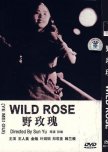
This review may contain spoilers
Uneven romantic comedy
Wild Rose was a romantic comedy highly influenced by Japan's invasion of the country. The understandable propaganda due to the crisis, juxtaposed to the comedy could come across as a strange combination.Wang Ren Mei made a delightful Wild Rose. Living in a small village with her father, Xiao Feng was vivacious and always with a smile on her face. Jiang Bo/Po, an artist from a wealthy family drives his fancy car into town and while painting pictures of the rural landscape becomes smitten with the wild girl. About this time Xiao Feng's father fights with a creepy old creditor who wants to buy Xiao Feng to square his accounts. Her father accidentally kills the man as the hut catches on fire. When he escapes and runs away it leaves Xiao Feng to believe he is dead. Jiang takes the newly orphaned Xiao Feng back to the city with him. He gives her a makeover before taking her home so that his father will accept her. After she commits a faux pas the father orders her out and Jiang went with her.
The coddled Jiang was introduced to how the other 99% live. With two low income friends they found a place to live already housing ten families run by a cranky landlady. Without his father's influence and connections, Jiang was unable to sell his paintings and turned to painting billboards. At first everyone was smiles and holding hands and then the unforgiving winter set in and the more unforgiving landlady. Playing housekeeping in poverty turned out to be a hardship with life and death on the line. Xiao Feng picked up a wallet dropped by a drunk but was chased by the police. Jiang and one of their friends take responsibility and are thrown in jail. Xiao Feng goes to Jiang's father, accepts full responsibility for his son's actions and promises to never see him again if he will save his son. Jiang's father agrees. Afterwards, Jiang and the boys search relentlessly for Xiao. In the end, when the movie takes a 90 degree turn, as support for the volunteer army is being drummed up, Jiang once again leaves home, this time for his country. In the recruiting parade are his old buddies and Xiao Feng. Even war can facilitate romance!
The print I watched was in bad shape with many scenes too dark to make out or cut off mid-frame. The acting overall was good, some better than others. This version had no music accompanying it.
Though it felt like we were supposed to side sympathetically, maybe even politically with the Wild Rose and eschew the filthy rich who focused on keeping the classes divided, the scenes involving the wealthy seemed lovingly luxurious. Only at the end when Jiang stepped away to pay attention to the volunteer parade did the oblivious dancing stop. The aristocrats seemed completely out of touch with what was going on in the streets. The military scenes and even the song and military inspection Xiao Feng performs with the children in her village could be jarring. "To love China is to love your mama!" Given their country was under attack it seemed reasonable to appeal patriotically to the audience even if it caused the movie to shift out of balance at times and could be heavy handed.
Wild Rose had some charming and inspiring moments interspersed, but overall felt uneven emotionally and narratively. As challenging as the degraded film could be to watch, most likely this is a film for silent film buffs or those who are fans of the director and/or cast.
5/11/23
Was this review helpful to you?
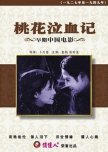
This review may contain spoilers
"Like teardrops, the petals from the peach tree fall..."
The Peach Girl was a tragic tale of forbidden love between the classes. Ruan Ling Yu and Jin Yan made for a beautiful and tormented couple in this classic silent film.Miss Lim (Ruan) and her parents worked on a large property. When Lim was a baby her mother planted a peach tree saying it was a symbol of her child's life. If the little girl was good it would blossom. Lim and the owner's son, Teh En, became friends despite his mother's disapproval. Even at the tender age of five, love blossomed along with the peach tree. Teh En moved away, later returning as a young man. He and Lim reconnected and their love continued. His mother still did not approve. Teh set Lim up in an apartment and told her his mother was going to let them marry. This was a bold-faced lie because his mother was arranging another marriage for him. When Lim's father found out what was going on and that Lim was pregnant, he confronted Teh En's mother who offered to pay them off. Insulted, Lim's father refused the money and was fired for his efforts.
"A man's life might be easily altered by circumstances." Teh En begs his mother to let him marry Lim and she responds by locking him up in their mansion. This was more in mind than physically because she was half his size and constantly shaking from her opium addiction. He could have easily pushed past her at any time. Teh's mom is worried about their "social dignity" more so than their familial integrity. Teh believes that "wealth or poverty does not come between love" but in real life that isn't always true, especially when descending from wealth into poverty and for a man who never worked a day in his life.
While Teh's mom tries setting him up with other girls Lim has their daughter. By this time Lim's mother has died and her father has been blinded. Melodrama thy name is Peach Girl. Lim's landlady attempts to pimp her out to an old man but upon seeing the peach blossoms she determines to stay strong.
"Sickness invariably visits the poor and helpless" especially in a Chinese silent films. Lim lays dying and Teh finally gains enough courage to push past his overly dramatic mother to run and stumble and run and stumble and run and stumble to the woman he loves. With Lim's last breath Teh promises to live to take care of their child and stand up to his mother.
The intertitles were beautifully decorated and had dialogue in English and Mandarin. In the version I saw there were also simpler English translations beneath for some intertitles. The print I watched had no music. I've read that silentfilm.org has added music on a DVD they released. By this time in Hollywood most movies, with the exception of Charlie Chaplin movies, had sound. Possibly due to access issues, lack of theatrical infrastructure, and Japan invading Manchuria in 1931, the Chinese were slower to add sound. Many frames were badly faded but did not take away from my experience.
Ruan Ling Yu's expressive face and the timeless story adapted well to silent film making the story easy to follow. This was not the best performance I've seen by Ling Yu, at times it was hampered by the thick white theatrical makeup. Without the gift of spoken words, she still conveyed a wide range of emotion brilliantly emoted through her facial expressions and body language.
Peach Girl's story at this time in history feels overly familiar, but in 1931 might have felt fresher. Perhaps due to the hard times, the plight of an abandoned woman often left with a child and living in poverty was a common theme in many of the surviving silent films I've watched. More often than not the woman was criticized by society but not the filmmaker as the film called out for audience sympathy. In this film, the director and writer highlighted the discriminatory gap between the classes. "Class distinction does not exist among children." The lesson was nearly always learned after a high price was paid.
The Peach Girl was entertaining and worth checking out if you enjoy older films and Ruan Ling Yu's performances. The alternate title, Peach Blossom Weeps Tears of Blood might have been more accurate for this film. "Observe how teardrops are petals of the peach tree…the peach tree speaks of love, of sorrow, and of tears."
5/11/23
Was this review helpful to you?

 54
54 195
195 11
11






















